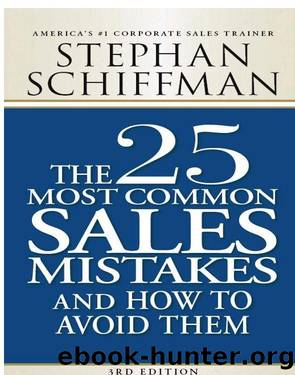The 25 Most Common Sales Mistakes by Stephan Schiffman

Author:Stephan Schiffman
Language: eng
Format: epub
Tags: ebook, book
Publisher: Adams Business, an imprint of Adams Media, Inc.
Published: 2010-08-25T00:00:00+00:00
M ISTAKE #16
Not Keeping Up to Date
Knowledge is power.
Suppose you walked in to see a current customer for an appointment, and your contact had lost an arm since you’d last seen him. Would you notice?
Granted, something that obvious probably wouldn’t get past you. However, there are clues and tipoffs that are, from the point of view of the prospect’s business, just as blunt—clues that are visible from the moment you walk in the door, but that many salespeople miss.
What is going on in the businesses of your clients? Do you know? If there were a major layoff in the offing, would you hear about it? Is the business doing well? Is a merger in the works? Are key people happy with your product or service, or is it something a budget-cutter might consider expendable?
Too many salespeople tend to think of “closed sales” as static things, and very little in business is static. The sad truth is, no business exists for the sole purpose of purchasing your product or service. If your customers do well, you will do well—and, conversely, if they do poorly, you will do poorly. Whatever the case, it is to your advantage to have accurate information ahead of time.
Observing the prospect closely, making an effort to understand exactly what’s happening at his or her business (and why), will help you gain a broader outlook on the whole environment in which your company operates.
Of course, watching your prospects firsthand isn’t the only weapon at your disposal. There are innumerable reports, journals, and newsletters available to you—and if you have many clients in a given industry, it’s a good idea to keep up with that industry’s trade news.
A salesperson I know named Marcia had been trying to get in touch with someone at a large company with regard to her company’s courier service. She was getting nowhere, and when her contact asked her to “send along some information,” she was convinced that she’d reached a dead end. Still, she dutifully mailed the information, but nothing happened for weeks on end. She wrote the account off.
Six months later, she received a call from her contact at the firm. Could she come in for an appointment right away? She could; and did; and made a big sale. Curios-ity got the better of her, though, and at the end of the meeting she came right out and asked: why had they waited so long to respond? The answer: the company’s main competitor had begun a new program earlier that year that required courier service. They were getting in on it now, and wished they had known about what their rivals were up to earlier.
The moral, of course, is that had Marcia been able to keep up with industry publications and/or gossip, she might well have been able to tell her contact how a courier service was working out for others in the industry—and closed the account months earlier.
Who does your prospect sell to? Who are your prospect’s competitors? How do these competitors
Download
This site does not store any files on its server. We only index and link to content provided by other sites. Please contact the content providers to delete copyright contents if any and email us, we'll remove relevant links or contents immediately.
| Advertising | Consumer Behavior |
| Customer Service | Marketing |
| Public Relations | Sales & Selling |
| Search Engine Optimization |
Influence: The Psychology of Persuasion by Robert B. Cialdini(4198)
The Miracle Morning by Hal Elrod(3933)
The Hacking of the American Mind by Robert H. Lustig(3595)
Pre-Suasion: A Revolutionary Way to Influence and Persuade by Robert Cialdini(3437)
Unlabel: Selling You Without Selling Out by Marc Ecko(3001)
Hidden Persuasion: 33 psychological influence techniques in advertising by Marc Andrews & Matthijs van Leeuwen & Rick van Baaren(2801)
Who Can You Trust? by Rachel Botsman(2739)
Kick Ass in College: Highest Rated "How to Study in College" Book | 77 Ninja Study Skills Tips and Career Strategies | Motivational for College Students: A Guerrilla Guide to College Success by Fox Gunnar(2727)
Purple Cow by Seth Godin(2712)
Ogilvy on Advertising by David Ogilvy(2707)
I Live in the Future & Here's How It Works by Nick Bilton(2538)
This Is Marketing by Seth Godin(2503)
The Marketing Plan Handbook: Develop Big-Picture Marketing Plans for Pennies on the Dollar by Robert W. Bly(2425)
The Power of Broke by Daymond John(2391)
Building a StoryBrand by Donald Miller(2376)
The 46 Rules of Genius: An Innovator's Guide to Creativity (Voices That Matter) by Marty Neumeier(2322)
Draw to Win: A Crash Course on How to Lead, Sell, and Innovate With Your Visual Mind by Dan Roam(2286)
The Tipping Point by Malcolm Gladwell(2214)
Market Wizards by Jack D. Schwager(2177)
